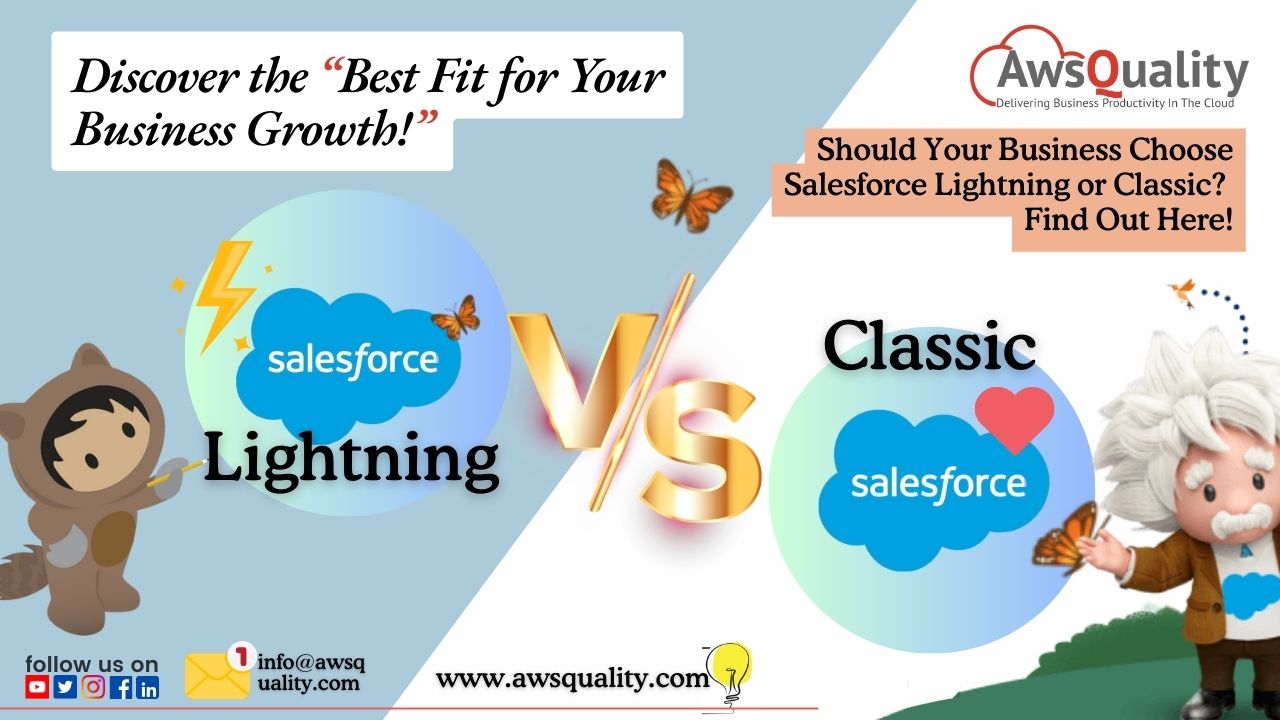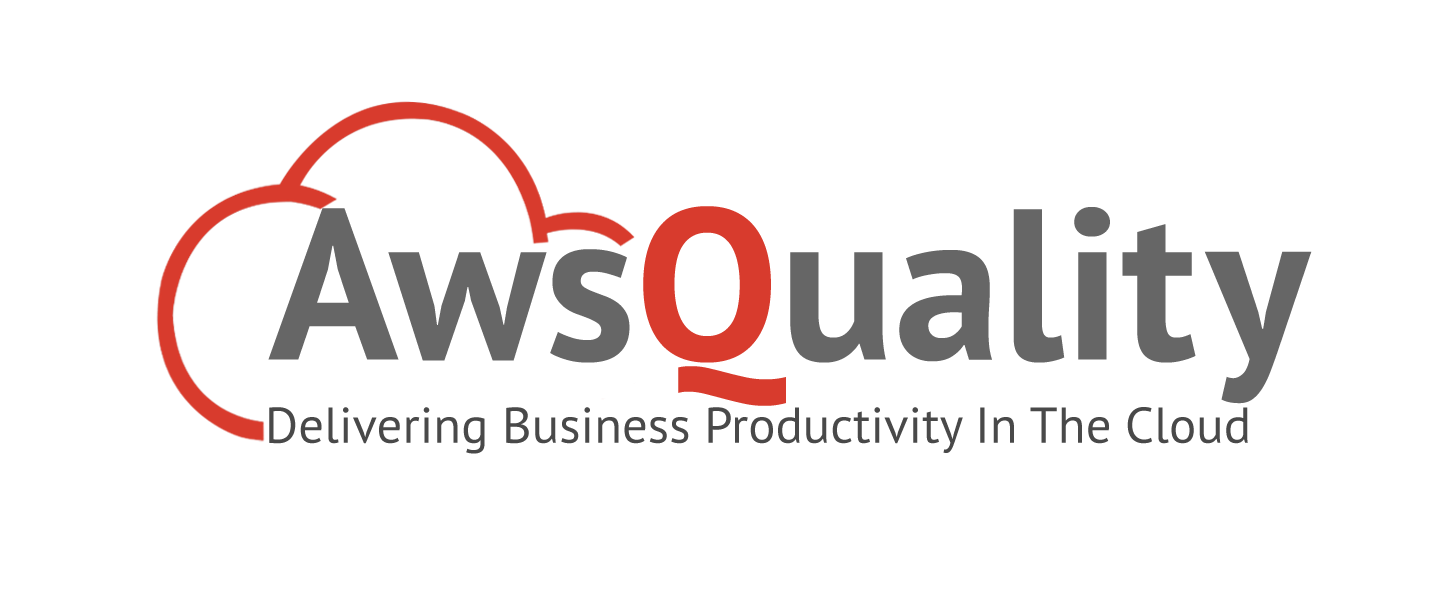
Choosing the correct CRM platform is crucial in today’s digital environment if you want to increase productivity, improve customer experiences, and achieve long-term company success. Being a Top Salesforce Consulting Company in the USA, AwsQuality is aware of how important it is for companies to decide between Salesforce Lightning vs Classic. Depending on the particular requirements and objectives of an organisation, Salesforce’s two interfaces—Classic and Lightning—offer different benefits. This post explores the distinctions between Salesforce Lightning and Classic to assist you in selecting the option that best meets your needs as a business.
Key Differences Between Salesforce Lightning and Classic-
1. User Interface (UI) and User Experience
Salesforce Lightning:- Designed with a modern, visually appealing interface, Salesforce Lightning prioritises ease of use and accessibility. The layout is intuitive, featuring drag-and-drop functionality and customizable dashboards that provide data insights at a glance. It’s especially suited for businesses creating an engaging and seamless user experience.
Salesforce Classic:- Classic’s traditional UI is familiar to many users, which can make it easier for teams that have been using it for years. However, it lacks the interactive elements, responsive design, and visual enhancements of Lightning. Organisations that prioritise stability over aesthetics may find Classic’s simpler UI a reliable choice.
2. Customization Options
Salesforce Lightning:- With its advanced customization tools, Lightning stands out for its flexibility. The Lightning App Builder and components let users build custom apps without extensive coding knowledge. This is a major advantage for organisations seeking scalable, custom solutions to align with their workflows. Lightning also integrates advanced automation tools like Process Builder and Flow Builder, making it easier to automate complex business processes.
Salesforce Classic:- Classic provides basic customization options but requires more technical expertise for advanced changes. Many of the dynamic customization features in Lightning are not available in Classic, which means development projects on Classic might take longer or require more technical resources.
3. Enhanced Features and Functionalities
Salesforce Lightning:- A feature-rich platform, Lightning includes functionalities like Einstein Analytics for AI-powered insights, Kanban view for intuitive opportunity tracking, and enhanced reporting tools. These features help users make data-driven decisions and provide an elevated user experience. Lightning also supports third-party apps and custom components from the AppExchange, enabling businesses to expand their CRM’s capabilities.
Salesforce Classic:- While Classic remains stable and functional, it lacks many of the enhanced features available in Lightning. Classic offers essential CRM functionalities, such as lead and contact management, but does not support Einstein Analytics or other AI-driven capabilities. This makes it less suitable for companies looking to leverage the latest analytics and data-driven insights.
4. Mobile Optimization
Salesforce Lightning:- Built with mobile-first functionality, Lightning provides a consistent experience across desktops, tablets, and mobile devices. Its responsive design allows users to access their CRM anytime, anywhere, which is essential for today’s on-the-go workforce.
Salesforce Classic:- Classic’s mobile capabilities are limited compared to Lightning. While it does offer mobile access, the experience is not as seamless or optimised, which can hinder productivity for businesses that rely heavily on mobile access.
5. Updates and Future-Proofing
Salesforce Lightning:- Lightning is continuously updated by Salesforce, which means that new features, improvements, and security enhancements are regularly added. By choosing Lightning, businesses can stay up-to-date with the latest technologies, ensuring that their CRM infrastructure remains future-proof.
Salesforce Classic:- Salesforce has stopped providing regular updates for Classic, which means businesses using it may miss out on new functionalities and performance enhancements. While Classic remains a stable platform, it may not be the best choice for companies focused on scalability and innovation.
When to Consider Upgrading to Salesforce Lightning
Choosing between Salesforce Lightning vs Classic depends on specific business needs and the value placed on modern features, mobility, and innovation. Here are some scenarios when upgrading to Lightning may be beneficial:
- Enhanced Productivity: With an intuitive UI and advanced automation tools, Lightning can help boost productivity by simplifying workflows and making it easier to manage tasks.
- Mobile-Driven Workforce: For organisations that require seamless mobile access, Lightning’s mobile-optimised design ensures a consistent experience across devices.
- Future-Proofing Your CRM: Since Salesforce regularly updates Lightning, upgrading to this interface ensures that you have access to the latest tools, technologies, and security enhancements.
- Advanced Analytics and Reporting: If your business relies on data to drive decision-making, Lightning’s built-in analytics and AI-powered tools offer a significant advantage.
Benefits of Choosing Salesforce Classic
While Lightning offers a wide range of advanced features, Classic may still be the best choice for organisations that need a simple, cost-effective CRM solution with a stable interface:
- Familiarity and Low Learning Curve: Classic’s long-standing interface is familiar to many users, which can reduce the time and cost associated with training employees on a new system.
- Cost Efficiency: Classic may be more affordable to implement, making it a good option for small businesses that don’t require the advanced capabilities of Lightning.
- Stability and Simplicity: Classic’s simple and stable design can be a good fit for organisations that only need essential CRM functionalities without the need for customization or mobile optimization.
Custom Salesforce Development Services for Both Classic and Lightning
As a Salesforce Development Company, AwsQuality has expertise in delivering custom Salesforce development services for both Classic and Lightning interfaces. Whether your business is aiming to maximise productivity with Salesforce Lightning or seeking the stability of Classic, AwsQuality offers tailored Salesforce consulting services to meet your unique needs. From custom app development to CRM implementation, our certified Salesforce consulting company provides comprehensive support to ensure your CRM strategy aligns with your business goals.
Key Services Offered by AwsQuality:
Salesforce Implementation Services: Guided CRM implementation to ensure smooth onboarding and system setup.
Custom Salesforce Development Services: Tailored CRM solutions for unique workflows, dashboards, and reporting needs.
Salesforce Lightning Development: Expert development services to create feature-rich, mobile-responsive applications within the Lightning platform.
Salesforce AppExchange Developer Services: Custom integrations and third-party app development on the Salesforce AppExchange.
Conclusion,
Making the Decision: Lightning or Classic?
The particular needs, objectives, and financial constraints of your company should ultimately determine which of Salesforce Lightning and Classic is best. Lightning is probably better if your company values cutting-edge technology, mobile accessibility, and an extremely customizable interface. Classic might still be a good choice for businesses looking for a dependable, uncomplicated CRM solution that requires little modification.
We at AwsQuality are committed to assisting companies in selecting the best CRM platform. Regardless of the interface selected, we offer comprehensive Salesforce consulting services and support as a Certified Salesforce Consulting Partner to guarantee a successful CRM journey. Get in touch with us at info@awsquality.com, AwsQuality, to discuss your alternatives and find the best Salesforce solution for your company.




